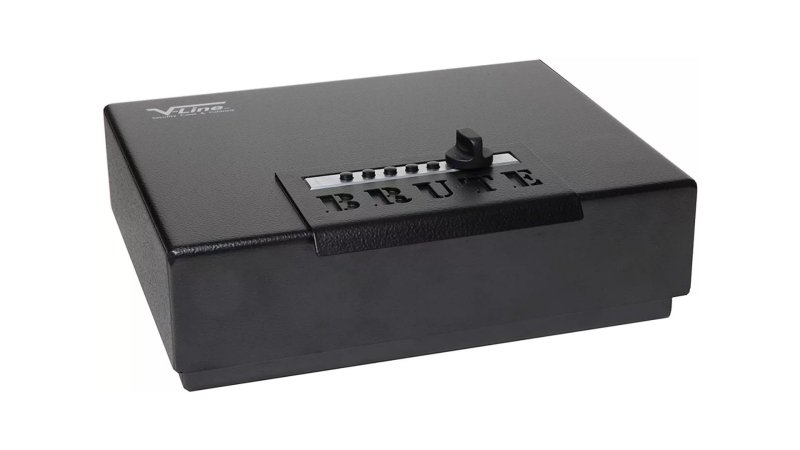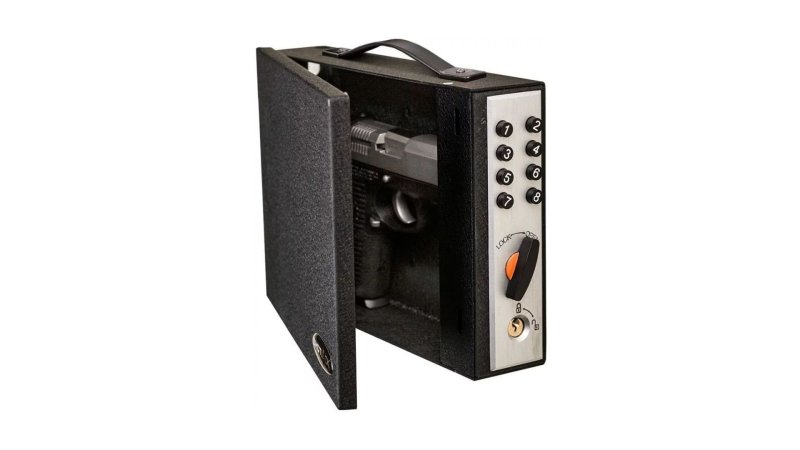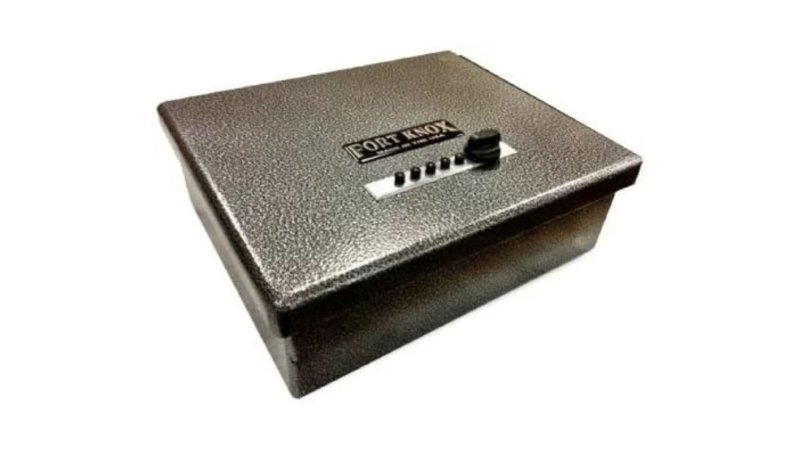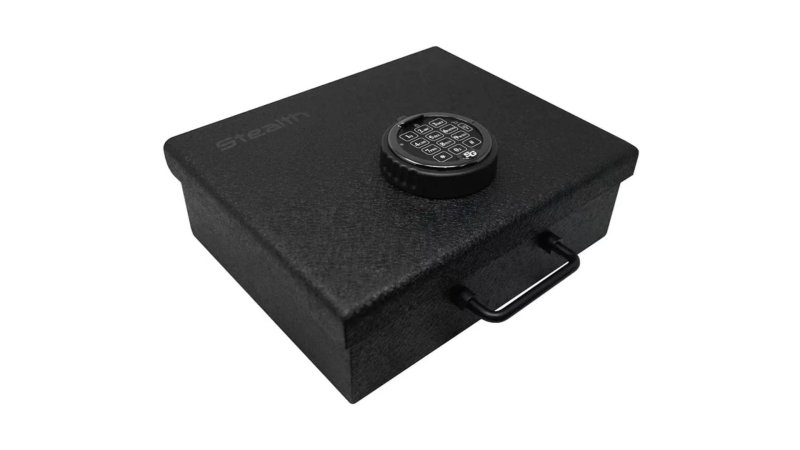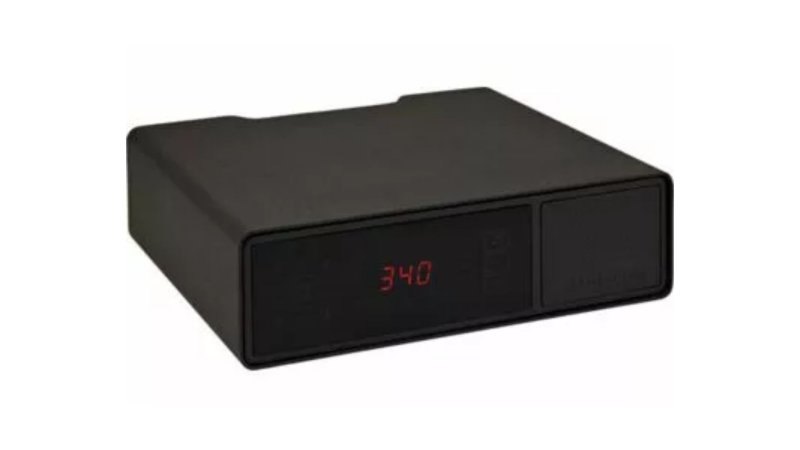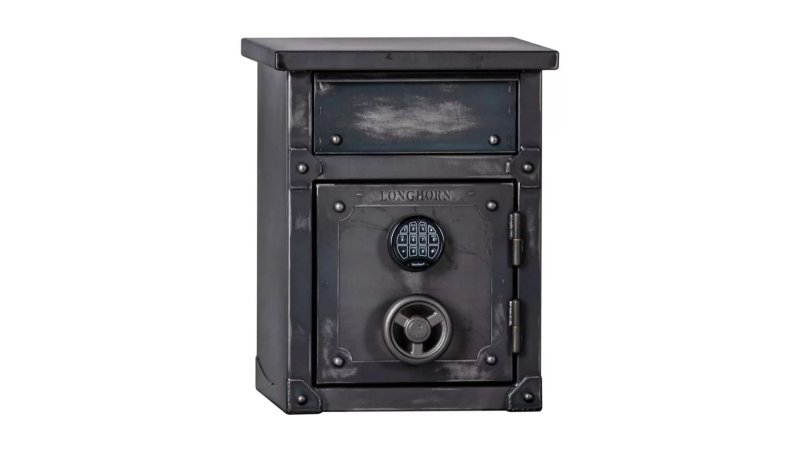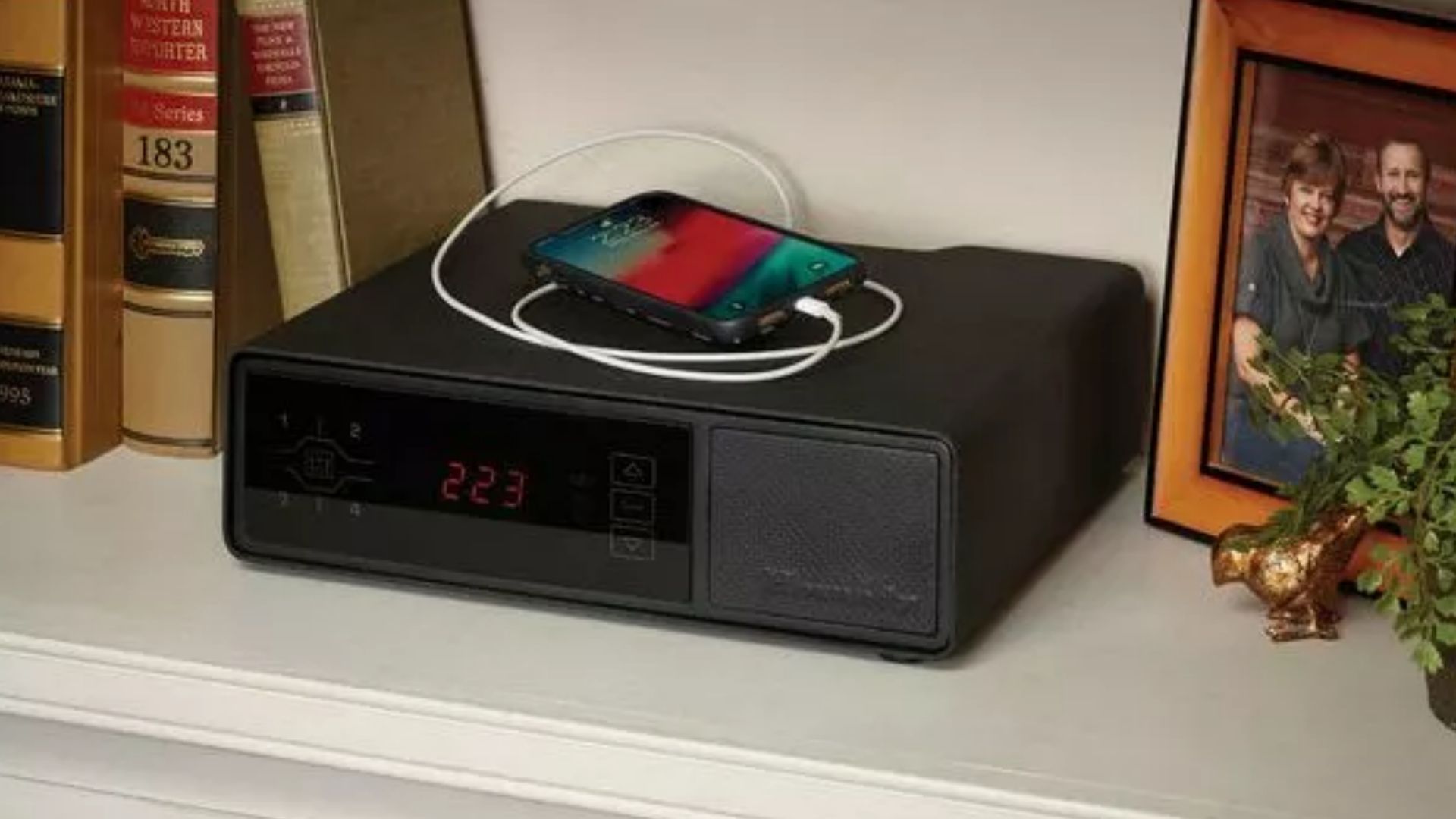

We may earn revenue from the products available on this page and participate in affiliate programs.
There it is, that dreaded bump in the night. Of course, your city requires all firearms to be locked up, and your safe is sitting a world away in the basement. With an intruder between you and your only means of self-defense, you suddenly regret passing up on that bedside gun safe you found on Black Friday last year. At the time, you thought it was gimmicky, and come on, man, you live in a good neighborhood. Who really needs a bedside gun safe in this part of town? Now, you’re wishing you’d listened to your gut (and your wife) instead of splurging on that $4,000 Barrett safe queen. Not only would you have saved a few grand toward your kids’ college funds, but your old Glock would be right where you need it now. Instead, you reach for your phone, punch in 9-1-1, and start looking around for your old softball bat. If only you’d bought that safe.
Best Overall
V-Line Brute
Pros
- Tough, durable construction
- Reliable, secure lock that is easy to access under stress, in the dark
- Excellent pry protection
- Includes lid lift handle
Cons
- Gas strut prevents lid from being thrown open
- Requires separate tools to change access code
Product Specs
- Type: Clamshell
- Lock: Mechanical (Simplex)
- Anchor points: Yes
- Handgun capacity: 2
- Weight: 22 pounds
- CA DOJ approved: Yes
Best Value
ShotLock Handgun 200M Solo-Vault
Pros
- Affordable
- Good value (with a little elbow grease)
- 2-year limited warranty
Cons
- May require minor retrofitting for maximum security
- Can be opened easily if dropped the right way
- Key override is easy to pick
Product Specs
- Type: Clamshell
- Lock: Mechanical (push button), key
- Anchor points: Yes
- Handgun capacity: 1
- Weight: 7.5 pounds
- CA DOJ approved: Yes
Editor’s Choice
Fort Knox Original Pistol Box
Pros
- Tough, durable construction
- Reliable, secure lock that is easy to access under stress, in the dark
- Includes tools for easy access code changes
- Limited lifetime warranty
Cons
- Gas strut prevents lid from being thrown open
Product Specs
- Type: Clamshell
- Lock: Mechanical (Simplex)
- Anchor points: Yes
- Handgun capacity: 2
- Weight: 21.5 pounds
- CA DOJ approved: Yes
Best Electronic
Stealth ShadowVault SV1
Pros
- Reasonably priced
- Tough, durable construction
- Excellent pry protection Includes valuable extras
Cons
- Electronic-only locking mechanism
- Gas strut prevents lid from being thrown open
Product Specs
- Type: Clamshell
- Lock: Electronic (Sargent u0026 Greenleaf Spartan)
- Anchor points: Yes
- Handgun capacity: 2
- Weight: 25 pounds
- CA DOJ approved: Yes
Best Low-Profile
Hornady RAPiD Night Guard
Pros
- Low-profile design
- Good security
- Doubles as bedside clock
- Includes battery backup feature
Cons
- Not the greatest value (MSRP)
- Relies more on stealth than strength for security
- Multiple accessories to secure for maximum security
Product Specs
- Type: Drawer
- Lock: Electronic, key
- Anchor points: Yes
- Handgun capacity: 1
- Weight: 18 pounds
- CA DOJ approved: Yes
Best Large
Rhino Metals Longhorn LNS2618
Pros
- Great aesthetic
- Tough, durable construction
- Large capacity
Cons
- Very expensive
- Electronic-only locking mechanism
- No way to hide this safe
Product Specs
- Type: Door
- Lock: Electronic
- Anchor points: Yes
- Handgun capacity: 25+
- Weight: 150 pounds
- CA DOJ approved: Yes
Why you should trust us
I’ve covered plenty of different gear for Task & Purpose, including gun cleaning kits, ankle holsters, and long-range scopes to name a few, but outside of work, I’ve got a few hobbies of my own. You see, I’ve got a fascination with security tools, technology, and techniques, and that applies to all kinds of security, such as home security, personal security, and cybersecurity. While satisfying my nerdy tendencies, I learned rather quickly to be skeptical of manufacturer claims and government ratings when it comes to security products like safes. Call me a killjoy, but I want to know what actually stops the bad guys.
As always, I relied on my own stores of nerdy knowledge to write this review, but to make sure I provided you with the best possible information on high-end bedside gun safes, I tapped into the experience and expertise of the folks at Anoroc Personal Defense Group, Gun Digest, Gun Safe Reviews Guy, Handgun Safe Research, KeepGunsSafe.com, LockPickingLawyer, Lucky Gunner Ammo, Lucky Gunner Lounge, NRA Family, Pew Pew Tactical, Riley’s Guns, Safe and Vault Store, The Safe Keeper, and U.S. Law Shield.
Types of bedside gun safes
Most gun safes are massive storage containers capable of resisting burglars, fire, and more, but when you need something close at hand for when you hear glass shattering in the night, a traditional door-style safe may not be your best option. As such, most bedside safes rely on one of three different designs to keep things handy and compact: clamshell, drawer, or dropdown.
Clamshell
The clamshell-type of safe is a simple, straightforward design and one of the most common. Opening a clamshell safe is as familiar as flipping open your new MacBook Pro with the added inconvenience of unlocking the lid first. Most often, the best clamshell safes rely on mechanical locks, although electronic locking mechanisms are also available.
These safes tend to provide plenty of storage space, multiple anchor points, sturdy construction, and some of the most secure and reliable lock offerings of all bedside safes. Clamshell-style safes can be reasonably portable —at least they can if they include a carry handle — although in many cases, clamshells lack this feature. Probably the biggest downsides to this safe type are a boring aesthetic and a space-hogging footprint.
Drawer
Drawer-type bedside safes can be incredibly convenient and usually fit nicely inside nightstand drawers or mount directly underneath bedside tabletops. These horizontal safes slide out smoothly for quick and easy access to your firearm while minimizing your need to move in order to reach your weapon. Like clamshell safes, drawer safes may employ either a mechanical lock or an electronic one.
Drawer safes tend to be quite convenient and often include anchor points and/or anchor cables to secure them in place. One potential drawback to drawer-type bedside safes is their mounting surfaces. While bolting the safe to your nightstand may make it childproof, a burglar could easily pick up and remove the entire table in order to take a crack at your safe when he has more time on his hands.
Drop-down
The drop-down bedside safe is a natural evolution of the drawer safe. These safes are vertically oriented and feature a lock at the top and a pivot point at the bottom. Once unlocked, these safes “drop” open, revealing a ready-to-use handgun. Most often, drop-down safes rely on an electronic lock with a key bypass in case you forget your passcode.
While drop-down safes may just be the most convenient for quick access, they often come with the drawback of limited mounting locations due to the inherent security downsides of mounting any safe to a “loose” piece of furniture. Their (usual) lack of a mechanical lock also makes them more susceptible to water damage and electronics failures, serious concerns in a life-or-death situation.
Key features of bedside gun safes
In many cases, bedside gun safes are designed to prevent children from accessing your firearm, turning these “safes” into secured gun cabinets. On the flip side, a true safe is hardened against burglary and similar crimes. For serious protection against fires, water, and other dangers, your best bet is to find a true gun safe, one capable of handling your long guns, ammo, and any valuables you might want to secure.
Construction quality
When it comes to the level of protection, most bedside “gun safes” are glorified gun cabinets that do little more than keep your boomsticks out of the hands of curious children. Even higher-quality bedside safes cannot compete with most full-size gun safes. As such, few bedside options will provide you with fire and water protection or a content value rating as found in tougher, larger safes.
To maximize your bedside gun safe’s level of protection (besides finding a truly secure mounting position) is to find one with thick building materials (16- to 10-gauge steel), proper welding, protected hinges, and a pry-resistant lid. Large gaps of any kind are a no-go, even if the model in question is California DOJ approved. Also, make sure your safe of choice has anchor points that allow you to bolt the safe to wall studs or directly to the floor. If, for some reason, anchoring your safe is not possible, make sure it comes with an anchor cable instead.
Locking mechanism (including ease of access)
Bedside gun safe locks come in a handful of different form factors. In most cases, these safes feature either a mechanical or an electronic lock. Mechanical locks usually come in the form of a number pad or Simplex locks and are incredibly reliable. Electronic locks usually feature a keypad with many sporting an RFID and/or fingerprint reader. These locks usually come with a key bypass and cheap ones can be spotty, prone to failure, and susceptible to water damage (think spilled milk).
With the exception of poor construction quality, a safe’s biggest weakness is its locking mechanism, and this weakness is two-pronged. Not only is physical security a serious consideration, but so is the ease of access. The best bedside safes are easy to access while fumbling around in the dark, so make sure to snag a safe that you can easily open under stress.
Benefits of bedside gun safes
Physical security
As with any safe, the most obvious advantage to owning a bedside gun safe is the perk of physical security. Of course, different people use different definitions of the term “physical security,” so it pays to clear things up in this regard.
In short, a properly secured, quality bedside gun safe will prevent your firearm from falling into the hands of snatch-and-grab burglars and curious children. While most such safes do not provide good protection against professional thieves, fires, and natural disasters, they provide more than enough physical security against the vast majority of dangers to your handgun.
Convenience
If we’re being perfectly honest, convenience rarely does more for us than make our lives easier. In most cases, it’s a want rather than a need, but when it comes to self-defense, convenience could actually mean the difference between life and death.
In a worst-case scenario, a bump in the night occurs when your defensive handgun is stowed away in your massive new Fort Knox safe hidden in the basement. In a slightly less stressful situation, your firearm will be secured in a bedside safe, giving you almost instantaneous access to your defensive weapon.
Bedside gun safes also provide a stationary storage location that provides predictable access to your handgun. Predictability allows for repeatable training, which in turn provides you with a better response under stressful circumstances.
Legal and insurance protection
A bedside gun safe can go a long way in protecting you both legally and financially. Some states have laws that require gun owners to lock away all unused firearms, including those you keep by your bedside. While those may seem like stupid laws, obeying them can stop a giddy lawyer from nailing your hide to the wall should your gun end up getting stolen. Lawyers and politicians are not your friends, and following the law will highly increase your chances of staying out of the clink (or is that Klink?).
A bedside gun safe also has the advantage of saving you some financial pain. Often, insurance policies that cover firearms lost in a house fire will NOT cover firearm theft. By locking your gun up, you decrease the possibility of having to cover the replacement costs of a stolen handgun out of your own pocket, but in some instances, you may even receive a discount on your monthly premium.
Pricing considerations for bedside gun safes
Budget
With few exceptions, bedside gun safes with a price tag below $200 should be avoided. While your budget certainly matters, a sub-$200 safe is likely to cost you a lot more than expected should you ever experience a burglary.
In most cases, cheap bedside gun safes fail to provide a reasonable amount of security beyond a simple childproof lockbox. These so-called “safes” usually exhibit some form of compromise, whether that be in the construction quality department or in the poor selection of a locking mechanism. As evidenced by YouTubers Handgun Safe Research and LockPickingLawyer, these safes consistently fail to keep beginner lock pickers, resourceful individuals, and/or gravity at bay, thus compromising your firearm’s security.
Mid-range
The reality is that quality and security come at a cost. If you need a bedside gun safe that will provide an actual layer of security between curious kids and the majority of criminals, then expect to drop anywhere between $200 and $300 for that peace of mind.
In most cases, mid-tier bedside safes feature high-quality mechanical locks that will provide you with security, durability, and reliability for years to come. In fact, many of these safes are tough enough to be passed on to the next generation.
On the flip side, most bedside gun safes in this price range do not include high-end electronics. Available offerings often are “good enough,” but with precious few exceptions, these are not heirloom quality electronics.
Premium
If you want to keep all but the most sophisticated (or well-financed) criminals at bay, you’ll need to set aside a minimum of $300, although in most cases, you are unlikely to spend more than $400. Safes with a minimum price tag of $300 tend to be the best of the best.
These safes feature thick steel and high-end locks, whether they be mechanical or electronic. While exceptions do exist, most of these safes are simple pistol boxes or safes with a more traditional style and function. That said, there are still a few gimmick (to some) options over $300, but these are the exception rather than the rule.
How we chose our top picks
Bedside gun safes are a niche product that serves as a middle ground between a simple lockbox and a fireproof, burglar-proof safe. Due to this unique role, we decided to focus on safes that provide a healthy balance between construction materials and quality, anchoring options, easy access, and resistance to attack. (We researched how easy these safes’ locks were to pick or exploit.)
Special shoutouts to Handgun Safe Research and LockPickingLawyer. We also checked out hands-on reviews for each product before adding them to our list. We want to thank Bosnian Bill, Dean Safe, The Gun Zone, Hai Tran, LockPickingLawyer, Stealth Safes, and Talon Sei for documenting their experiences with each of these products, but a special shout out goes to Dave Goetzinger of Handgun Safe Research who provided tons of valuable information on the offerings from Fort Knox, Rhino Metals, ShotLock, Stealth Safes, and V-Line.
FAQs on bedside gun safes
You’ve got questions, Task & Purpose has answers.
Q: Are gun safes worth it?
A: Yes. Although a lockable case won’t prevent a thief from stealing your gun (by stealing the case), it does act as a deterrent and greatly reduces the chances of an unauthorized user from gaining access to your firearm, while simultaneously giving you quick access. A gun safe, on the other hand, is better suited for preventing theft because of the bulk and weight.
Q: Where should I keep my gun in the bedroom?
A: For a bedside gun safe, it makes sense to mount it within easy reach of where you sleep. That said, make sure your safe is secured to the floor, wall, or similar anchor point so a burglar can’t walk away with the unopened safe in hand while you’re out on the town.
Q: Do biometric gun safes work?
A: We recommend avoiding biometric gun safes as their electronic components are susceptible to water damage and can be unreliable. Also, many biometric safes come with very loose fingerprint reading tolerances in order to maximize your ability to open the safe. Unfortunately, this results in a higher likelihood of a false positive reading, giving unauthorized individual access to your weapon.
